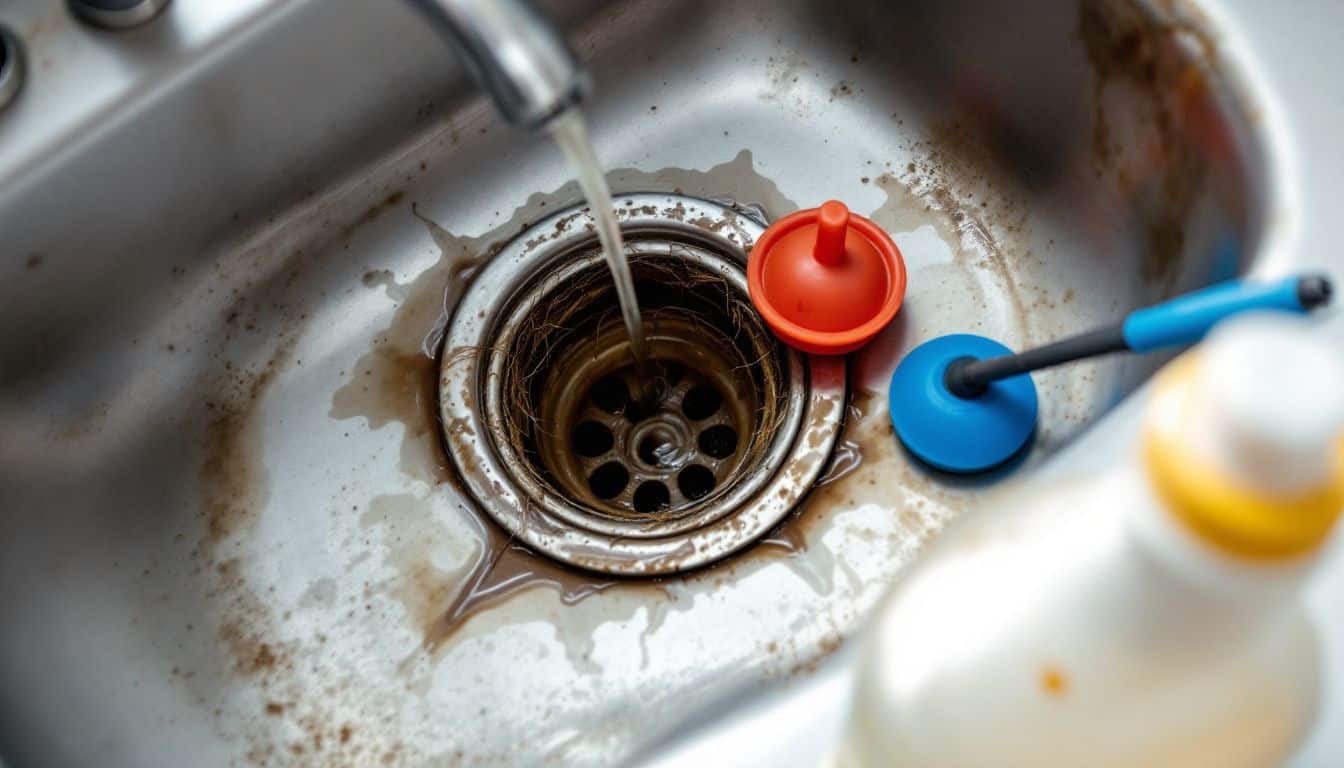Ever had a sink that just won’t drain? It’s a common headache for homeowners. Did you know that New York City spent a whopping $18 million on sewer backups in just five years? Yikes! This blog post will uncover five surprising secrets about how drain cleaning works.
So, ready to become a drain-busting pro?
Key Takeaways
Drain cleaners work through chemical or enzymatic action to break down clogs. Chemical cleaners use acids, bases, or oxidizers, while enzymatic cleaners use bacteria.
Common causes of drain blockages include grease and food scraps in kitchen sinks, and hair and soap scum in bathroom sinks.
Chemical drain cleaners can damage pipes over time. They generate heat that can warp plastic pipes and corrode metal ones.
Natural alternatives like baking soda and vinegar, or hot water and dish soap, can effectively clear minor clogs without harming pipes.
New York City spent $18 million on sewer backups in just five years, highlighting the widespread nature of drain issues.
Table of Contents
How Drain Cleaners Function
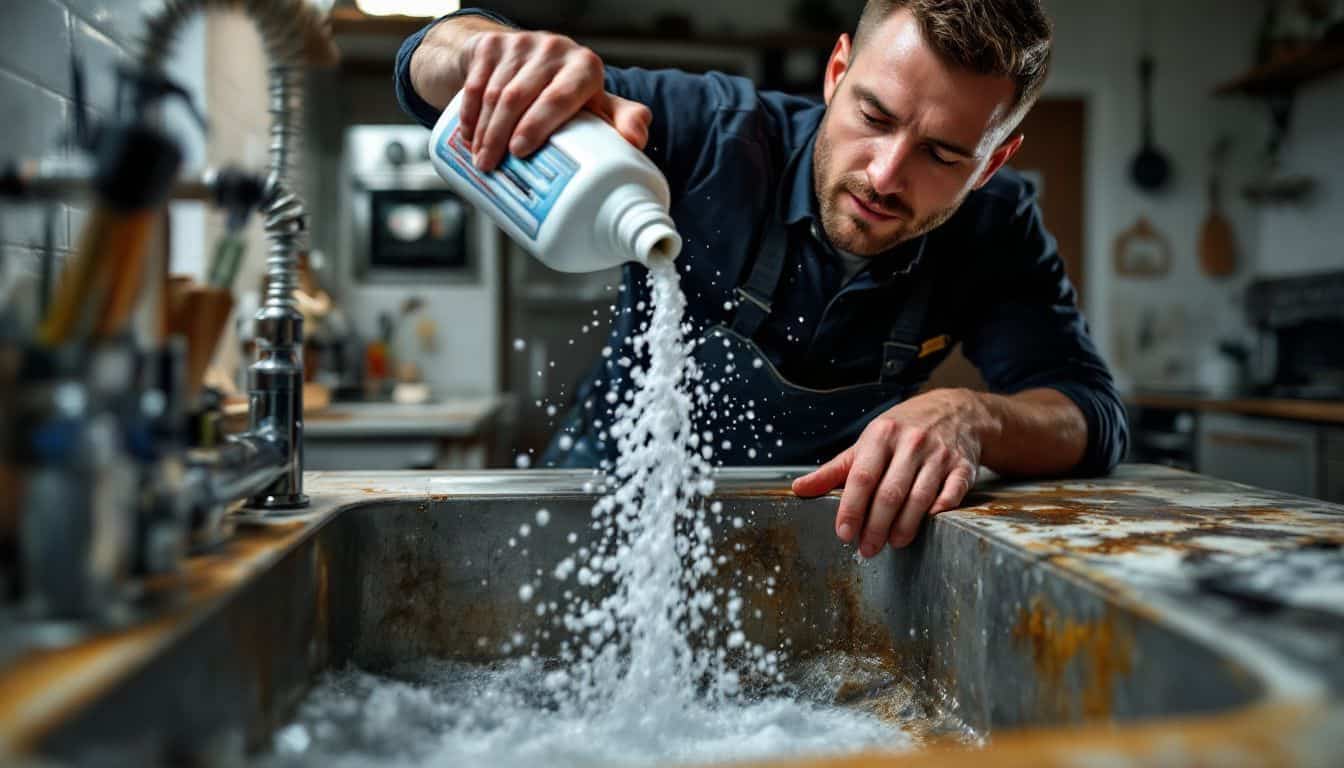
Drain cleaners are like magic potions for your pipes. They work in two main ways – chemical brews that eat through gunk, and enzyme mixtures that gobble up organic stuff. Any experienced plumber Detroit residents trust will tell you that understanding how these products work is essential for proper drain maintenance.
Chemical-Based Cleaners
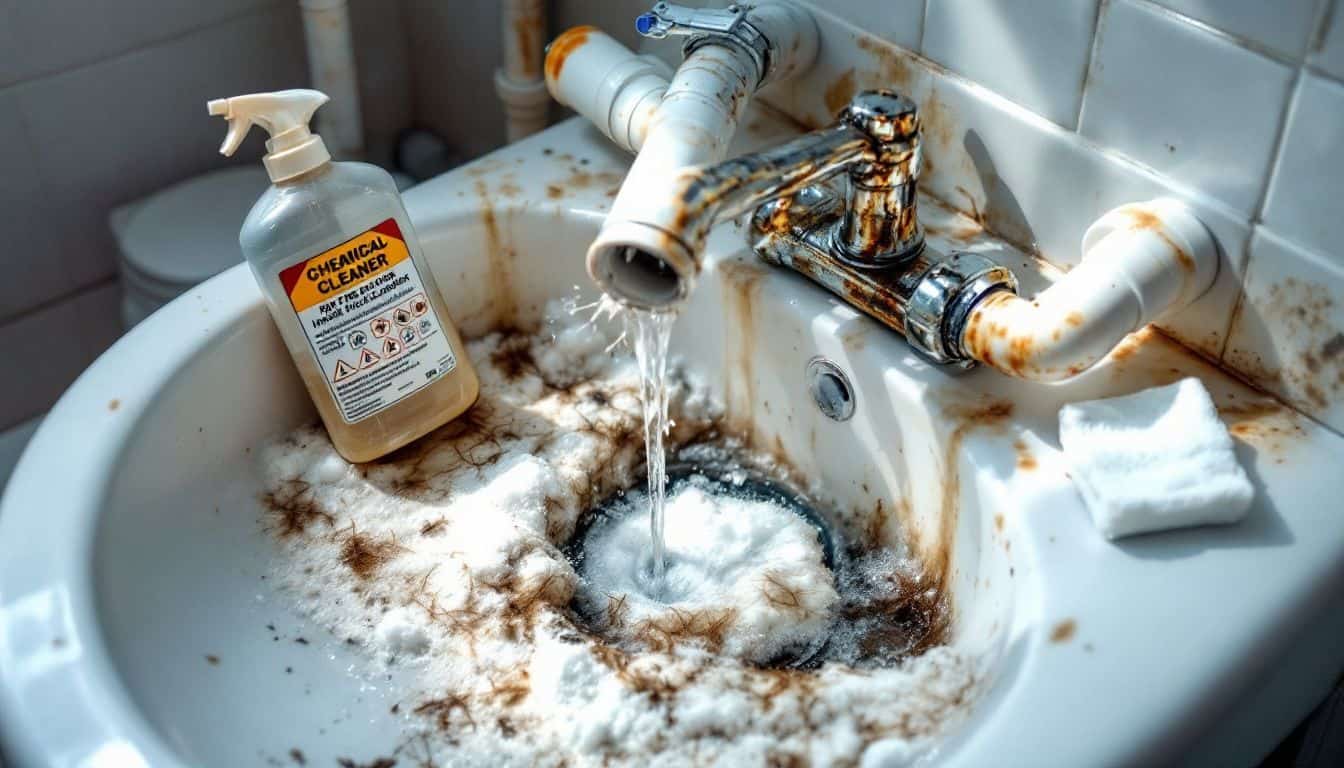
Chemical-based drain cleaners pack a powerful punch. These liquid solutions contain strong acids or bases that break down clogs fast. Acidic cleaners, with hydrochloric or sulfuric acid, create heat through acid hydrolysis to melt blockages.
Caustic cleaners use lye (sodium hydroxide) to produce a chemical reaction that generates hydrogen gas and heat.
According to FS Drainage, a professional drain cleaning company in North London, oxidizing cleaners are another option. These contain nitrates, peroxides, or bleach (sodium hypochlorite).
A standard bleach solution is 5.25% sodium hypochlorite. While effective, these cleaners can be harsh on pipes. They may damage certain materials like PVC or aluminum. It’s crucial to use them carefully and follow safety instructions.
Chemical drain cleaners are like a double-edged sword – they clear clogs but can harm your pipes if not used right.
Enzymatic Solutions
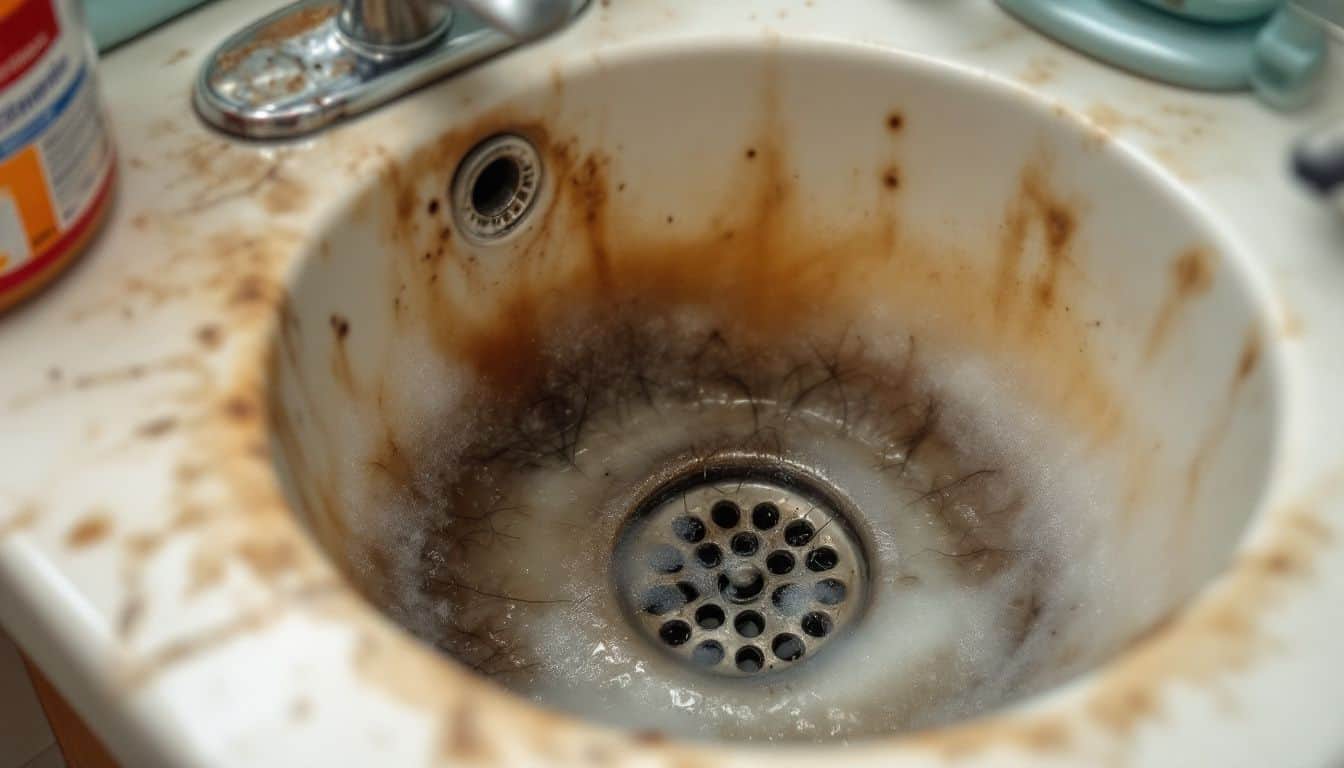
Enzymatic solutions offer a gentler approach to drain cleaning. These cleaners use helpful bacteria to munch away at organic gunk in your pipes. Think of them as tiny, hungry helpers that love to eat the stuff clogging your drains.
They’re safe for your plumbing and won’t harm septic systems. But here’s the catch – they work slowly. You’ll need patience as these little guys do their job.
For regular drain care, enzymatic cleaners are a smart choice. They keep things flowing smoothly without harsh chemicals. But if you’ve got a massive hairball or a stubborn clog, they might not cut it.
In those cases, you might need something stronger. Let’s look at what causes those pesky blockages in the first place.
Typical Reasons for Drain Blockages
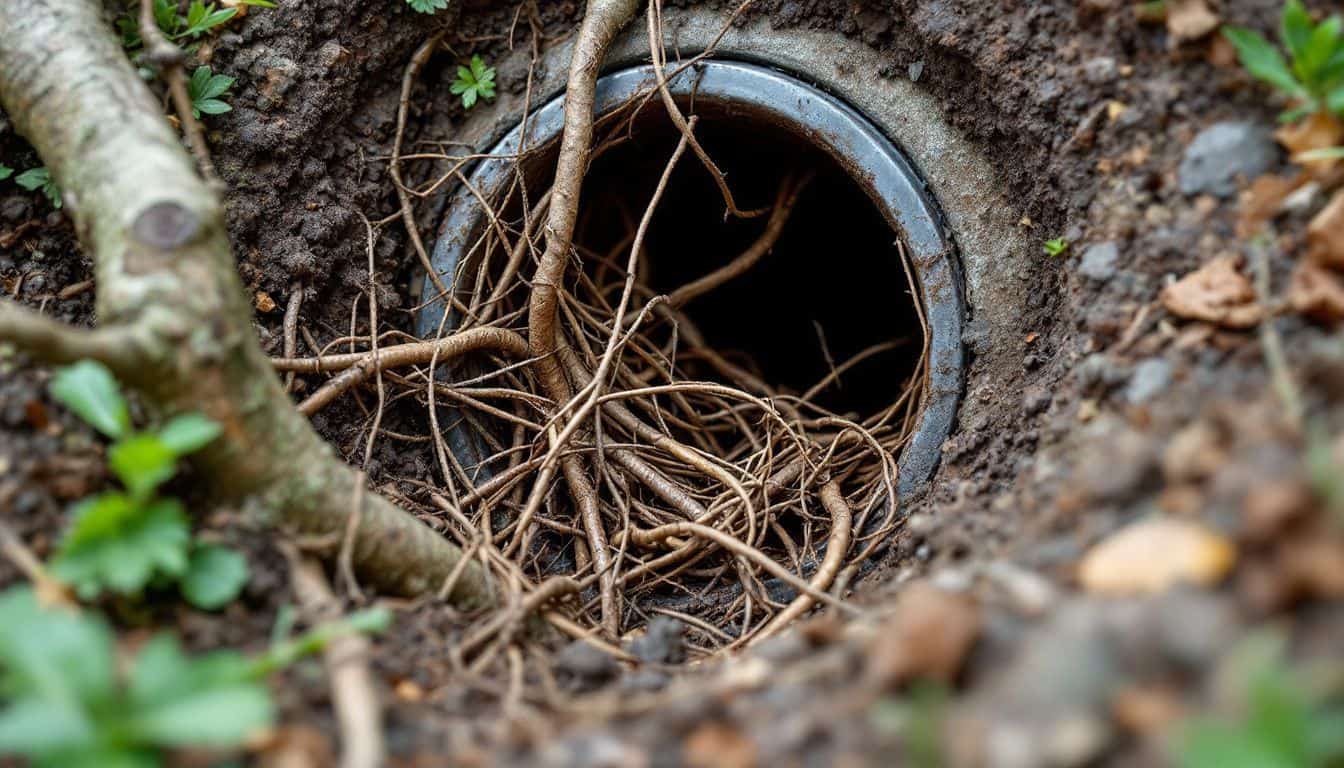
Ever wonder why your drains keep acting up? It’s not just about what goes down the pipes. Sometimes, it’s the sneaky stuff you don’t even think about – like soap scum or tree roots – that’s causing all the fuss.
Kitchen Sink Blockages
 Kitchen sink blockages are a real pain. Grease, fat, and oil are the main culprits. They stick to pipes and trap other stuff. Food scraps like coffee grounds and eggshells make it worse.
Kitchen sink blockages are a real pain. Grease, fat, and oil are the main culprits. They stick to pipes and trap other stuff. Food scraps like coffee grounds and eggshells make it worse.
They build up over time and clog the drain.
You can prevent these clogs easily. Use an old coffee can to toss out grease. Put a strainer in your sink to catch food bits. Run water while using the disposal. These simple steps keep your pipes clear.
I learned this the hard way after a nasty clog last year. Now, I’m extra careful about what goes down my drain.
An ounce of prevention is worth a pound of cure.
Bathroom Sink Clogs
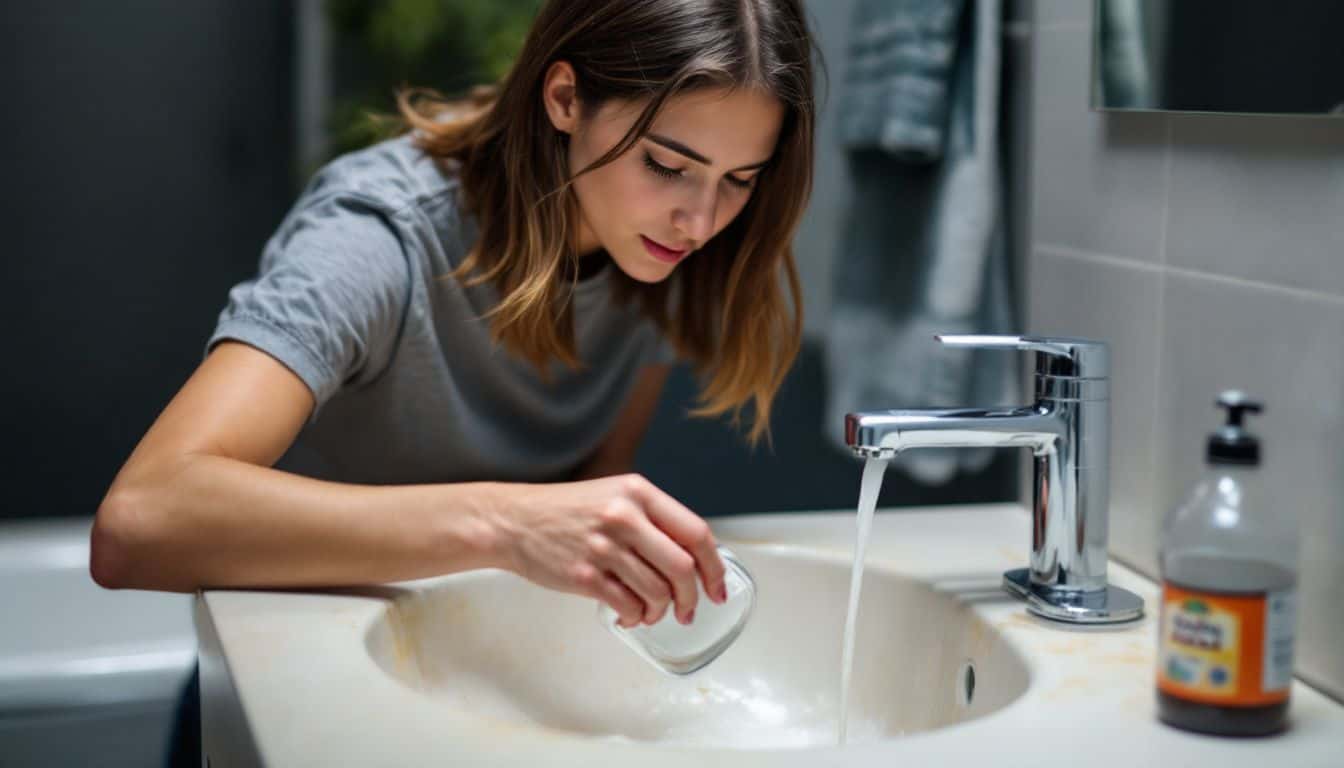
Moving from kitchen to bathroom, let’s tackle another common problem: bathroom sink clogs. These pesky blockages often stem from a different culprit than their kitchen cousins. Hair is the main troublemaker here.
It tangles up with soap scum, creating a nasty mess that slows your drain to a crawl. Ladies, we’ve all been there – brushing our hair or shaving, not realizing we’re setting up a future headache.
But don’t worry, there are ways to keep your sink flowing freely. Regular cleaning is key. A simple mix of baking soda and vinegar can work wonders. Pour it down the drain, let it fizz, then flush with hot water.
This natural solution is gentler on your pipes than harsh chemicals. For stubborn clogs, a drain snake might be your best bet. It’s a handy tool that can reach deep and pull out that hair-and-gunk combo.
And here’s a pro tip: after a bathroom remodel, consider installing a drain cover. It’ll catch hair before it becomes a problem.
Advantages and Disadvantages of Chemical Cleaners
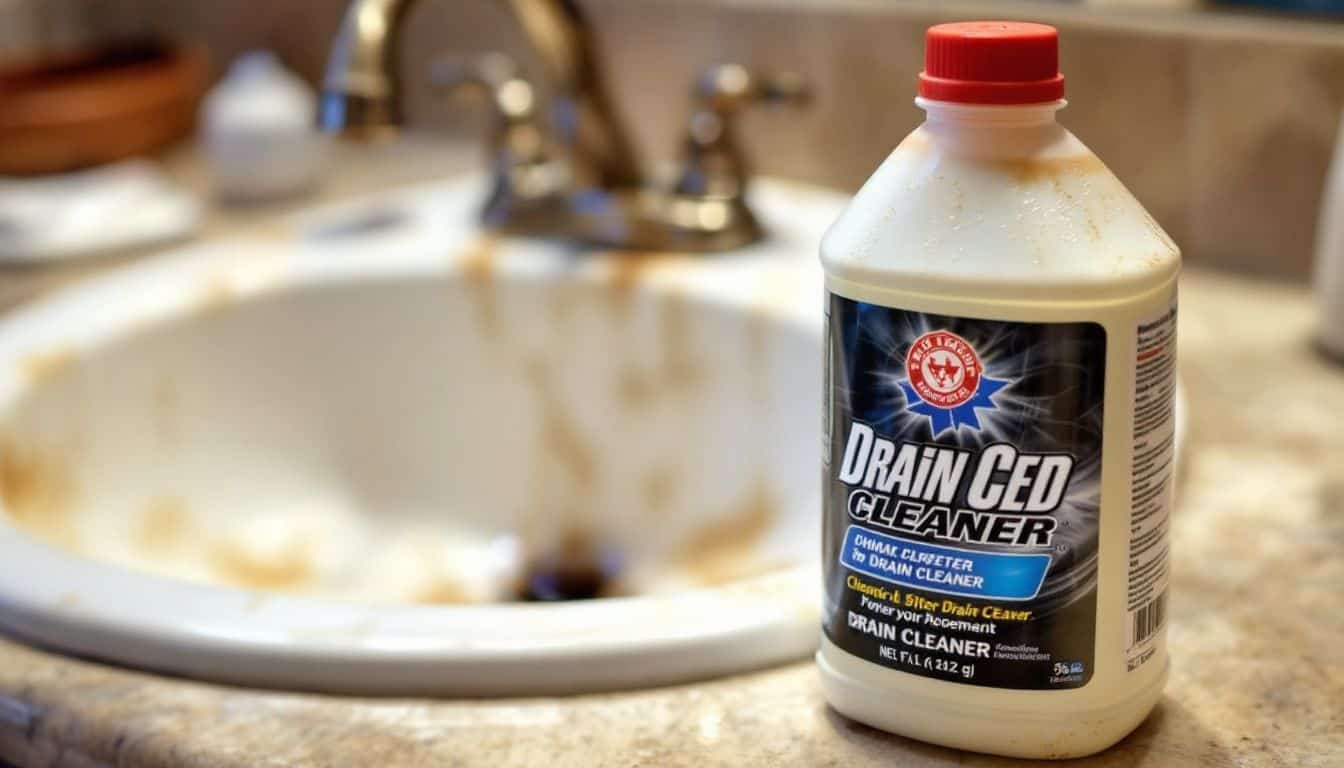
Chemical cleaners pack a punch against stubborn clogs. But they’re not all sunshine and roses – these powerful solutions come with their own set of risks. Let’s dive into the good, the bad, and the ugly of using these drain-busting concoctions….
Effect on Different Types of Clogs
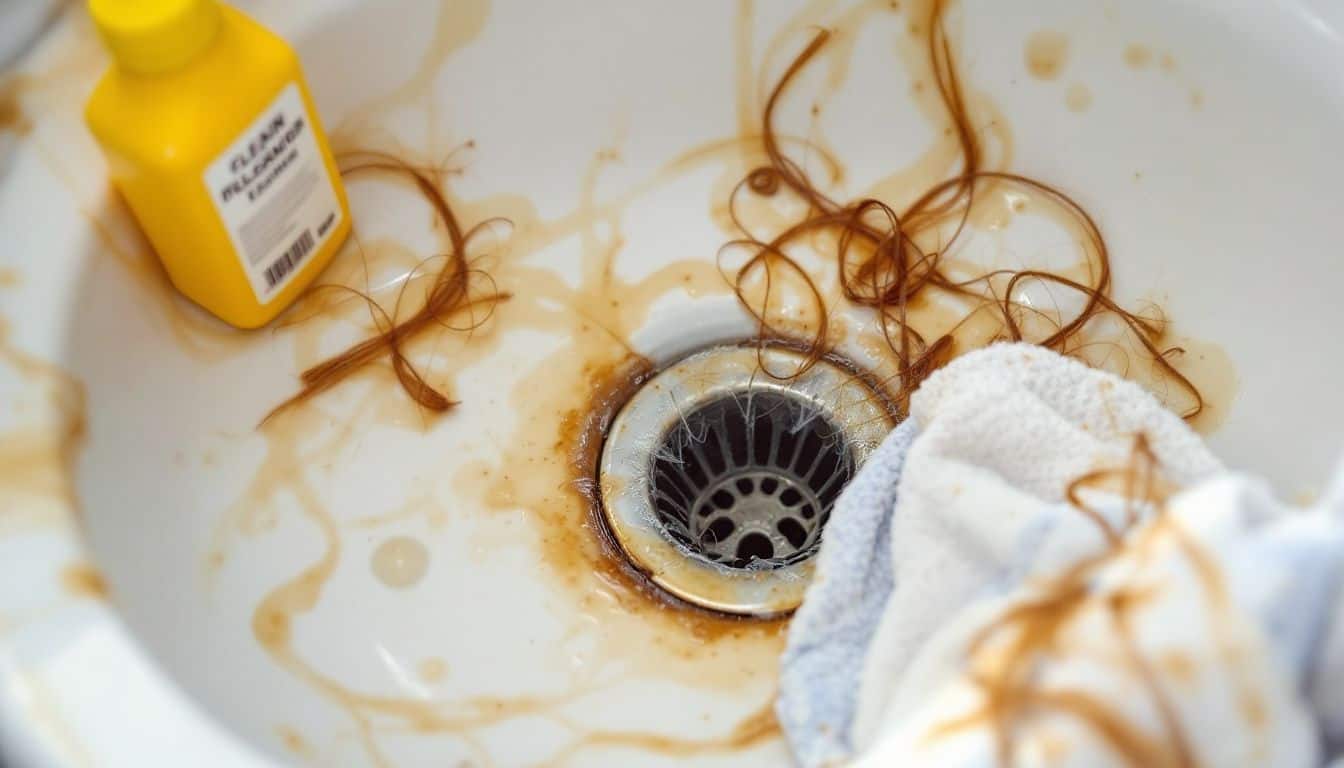
Chemical cleaners pack a punch against different clogs. Hair tangles? Zap! Grease buildup? Gone! Soap scum? Sayonara! These powerful solutions work magic on common bathroom and kitchen blockages.
But here’s the rub – they’re not a cure-all. Tough, recurring clogs might laugh in the face of these cleaners. That’s when you know there’s a deeper issue lurking in your pipes.
Let’s talk safety, ladies. These cleaners are no joke. They contain some pretty harsh stuff – sulfuric acid, sodium hydroxide, even bleach. Yikes! While they’re great at busting clogs, they can also do a number on your pipes over time.
And don’t get me started on the environmental impact. So, what’s a girl to do? Well, there are gentler options out there. Let’s explore some natural alternatives that’ll keep your drains flowing without the chemical cocktail.
Risks to Plumbing Systems
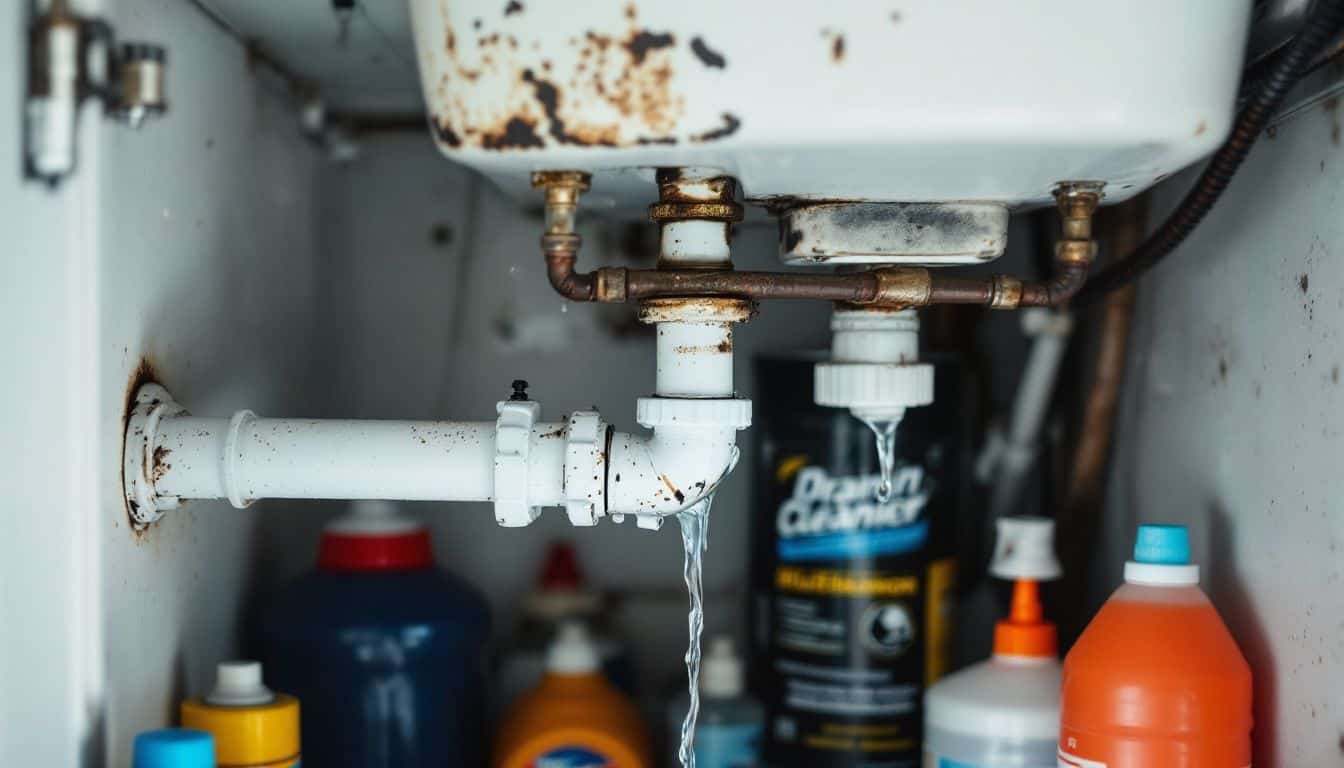
Chemical cleaners can wreak havoc on your pipes. These harsh products generate heat, which can damage PVC pipes over time. Lye and sulfuric acid, common ingredients in these cleaners, eat away at your plumbing.
This leads to leaks, burst pipes, and costly repairs. Many plumbers deal with pipe damage caused by these products daily.
Liquid drain cleaners pose a serious threat to your home’s plumbing health. Misuse of these products can cause significant harm. They corrode metal pipes and weaken joints. The heat they create can warp plastic pipes.
In time, this damage adds up, leaving you with a big mess and an even bigger bill. Let’s look at some safer alternatives to keep your drains flowing freely.
Natural Alternatives to Chemical Cleaners
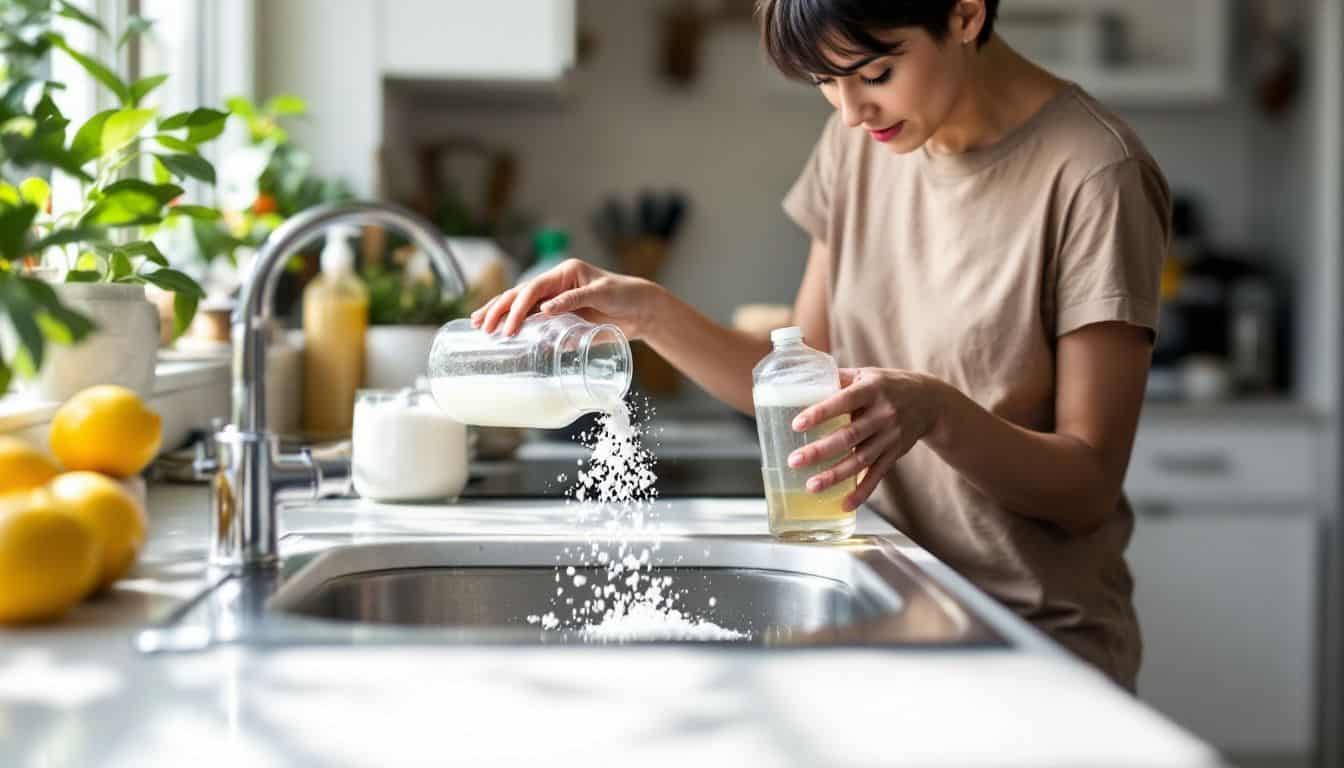
Tired of harsh chemicals? Let’s explore some gentler options for your pipes. These natural fixes can work wonders – and they’re probably already in your kitchen!
Using Baking Soda and Vinegar
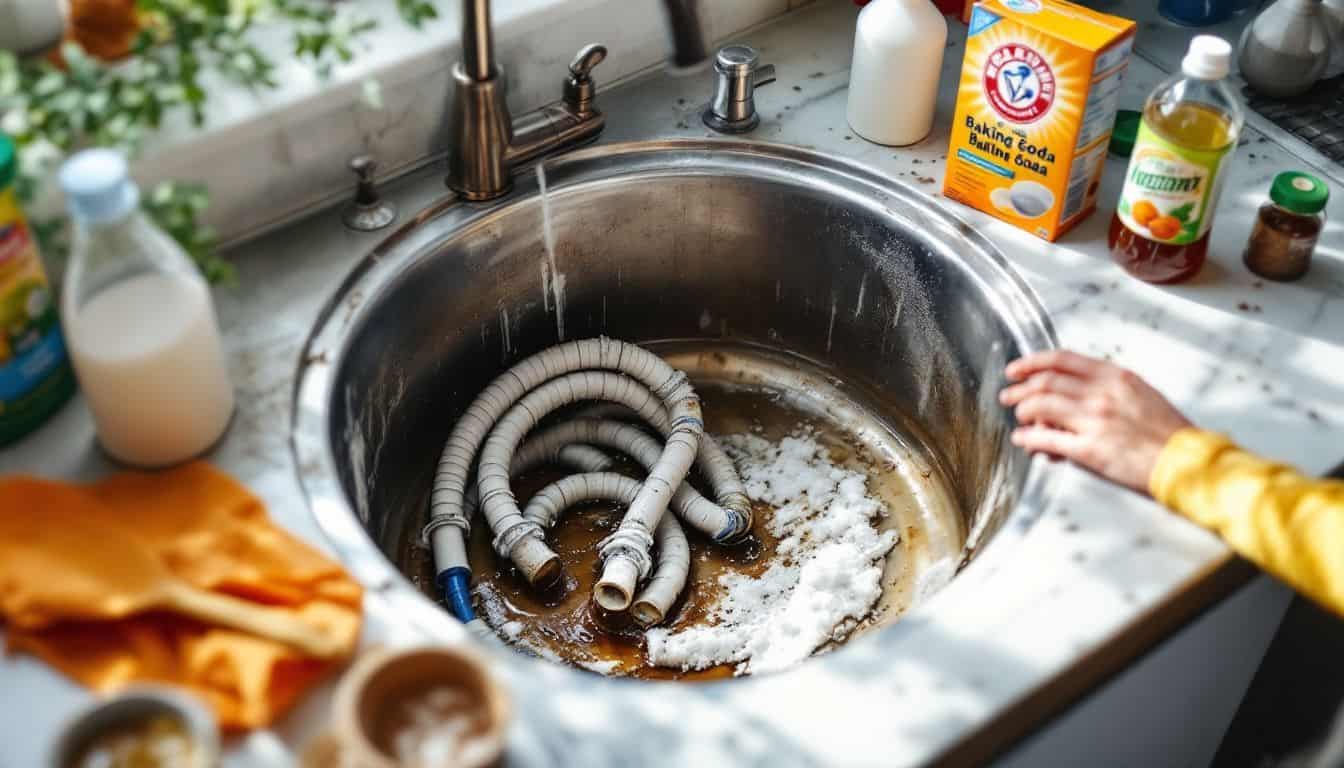
Baking soda and vinegar make a great team for clearing drains. This duo is cheap and easy to find in most kitchens. You start by pouring boiling water down the drain. Next, add baking soda and let it sit.
Then, pour in vinegar. The mix will fizz and bubble, helping to break up gunk. After a short wait, rinse with hot water. This method can work wonders on minor clogs.
Many women love this eco-friendly fix. It’s gentler on pipes than harsh chemicals. Plus, it’s safe for kids and pets. But results can vary. Some swear by it, while others need a pro for tough clogs.
You can boost its power by using a plunger too. Or try mixing in other safe items from your pantry. It’s worth a shot before calling a plumber!
Applying Hot Water and Dish Soap
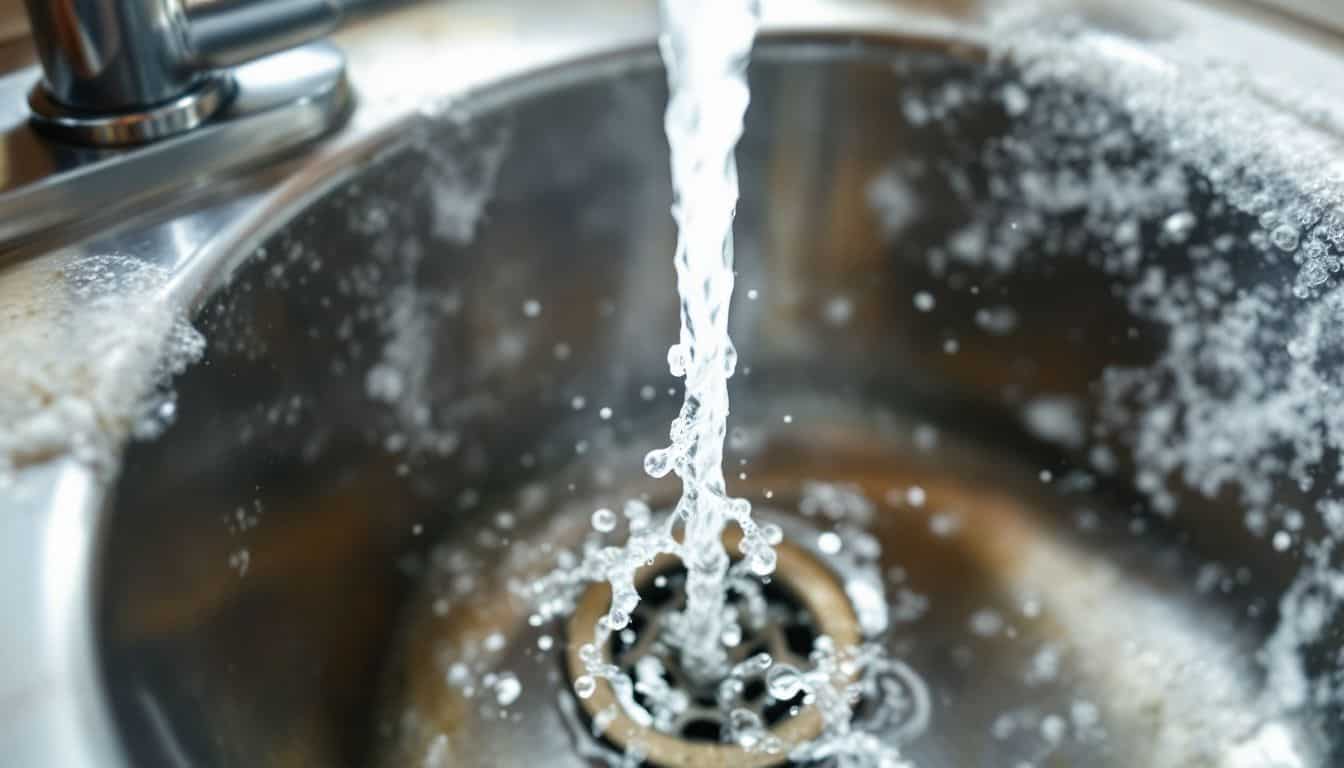
Hot water and dish soap are a dynamic duo for drain cleaning. This simple trick works wonders on greasy clogs. Just boil a liter of water and mix in a few squirts of liquid dish soap.
Pour this soapy solution down your drain, and watch the magic happen! The hot water melts the grease, while the soap helps break it down further. It’s like giving your pipes a mini spa day.
I’ve used this method countless times in my kitchen sink. It’s a lifesaver when bacon grease or cooking oil builds up. Plus, it’s way gentler on your pipes than harsh chemicals. No need to worry about damaging your plumbing or exposing yourself to nasty fumes.
Just make sure to follow up with a hot water rinse to flush everything out. Your drains will thank you!
People Also Ask
What’s the deal with those acidic drain cleaners?
Acidic drain cleaners are like tiny chemists for your pipes. They use hydrochloric or sulphuric acid to break down gunk. These cleaners start a chemical party in your drains, dissolving hair, soap scum, and other nasties. But watch out! They can be tough on your plumbing too.
How do oxidizing drain cleaners work their magic?
Think of oxidizing cleaners as the superheroes of drain unclogging. They swoop in with household bleach or other oxidizers to save the day. These cleaners oxidize the gunk, turning it into a form that’s easier to wash away. It’s like they’re giving the clog a makeover!
What’s the scoop on caustic drain cleaners?
Caustic cleaners are the heavyweight champions of drain cleaning. They use caustic potash or other alkaline substances to fight clogs. These cleaners are so strong, they can even dissolve grease! But remember, with great power comes great responsibility. They can be harsh on your pipes too.
Are there any risks when using these drain cleaners?
You bet! These cleaners aren’t playing around. They’re corrosive materials that can cause burns and damage to your eyes. Always use eye protection and follow the instructions to a T. And if you’re not sure, call in the pros at Eyman Plumbing Heating & Air. Better safe than sorry!
Can these cleaners harm my plumbing system?
Absolutely. These cleaners don’t discriminate between clogs and your pipes. They can be tough on metals and even eat away at polyvinyl chloride. If used too often, they might damage your shower, water heater, or even your HVAC system. It’s like using a sledgehammer to hang a picture – sometimes it’s overkill!
References
https://trusteyman.com/blog/how-does-a-chemical-drain-cleaner-actually-clear-the-clog/ (2021-04-19)
https://bumblebeeplumbingaz.com/do-enzyme-drain-cleaners-really-work/
https://www.joesdraincleaning.com/how-drain-cleaners-work/ (2023-09-16)
https://www.angi.com/articles/what-causes-clogged-kitchen-sink.htm (2024-05-16)
https://www.themvpkc.com/15-common-causes-and-tips-for-a-clogged-drain/
https://orchardbathrooms.com/uncategorized/the-pros-and-cons-of-using-chemical-drain-cleaners-what-you-need-to-know/ (2023-05-24)
https://www.stephensplumbing.com/how-to/the-pros-cons-of-chemical-drain-cleaning-vs-mechanical-drain-cleaning/ (2022-10-14)
https://certifiedplumbingmi.com/pros-and-cons-of-using-chemical-drain-cleaners/
https://crunchybetty.com/clean-your-drains-baking-soda-vinegar/ (2017-12-19)
https://pjsplumbingandheating.com/5-ways-to-clean-your-drains-naturally/ (2023-02-17)
